|
Information
Service of
the Serbian Orthodox Church
Oktober 25, 2004

BARBARIC
DESTRUCTION OF MONASTERY CHURCH
OF MONASTERY OF ST. JOHN CHRYSOSTOM
IN THE VILLAGE OF NIZEPOLJE NEAR BITOLJ
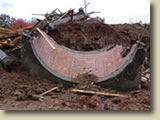 Promises
given by the president of the Former Yugoslav Republic of Macedonia
Branko Crvenkovski to the archschismatic Stefan "that he
would discipline Vranishkovski" under the condition that
the so-called Macedonian Orthodox Church does not interfere in
the organizing of the referendum have been kept very quickly.
Today, shortly before midnight, the state inspection of the Ministry
of Transportation and Telecommunications of the Former Yugoslav
Republic of Macedonia destroyed the monastery church in the monastery
of St. John Chrysostom and the support walls on the inclined terrain
where the monastery is being built. They did not present an official
decision for the removal of the building and were accompanied
by a strong police escort. The schismatic Metropolitan Petar shamelessly
advised that he had sent no less than seven requests for the destruction
of the church and exclaimed with delight: "The church should
have been torn down five months ago." Without any Christian
conscience, let alone virtues of a bishop, the schismatic Petar,
after chasing out the monks and nuns who selected the Orthodox
Archdiocese of Ochrid in the dead of night and in the middle of
winter, now wants to completely destroy all the monastics in the
Bitolj region. Monks and nuns only bother the Godless, the Devil
and Petar. How miserable of a man to demand and to rejoice at
the destruction of a church and a monastery. Even the Muslims
are reluctant to do this, knowing that God's justice will find
them sooner or later; the only ones not afraid are schismatics
who have already shown their true face before all. Promises
given by the president of the Former Yugoslav Republic of Macedonia
Branko Crvenkovski to the archschismatic Stefan "that he
would discipline Vranishkovski" under the condition that
the so-called Macedonian Orthodox Church does not interfere in
the organizing of the referendum have been kept very quickly.
Today, shortly before midnight, the state inspection of the Ministry
of Transportation and Telecommunications of the Former Yugoslav
Republic of Macedonia destroyed the monastery church in the monastery
of St. John Chrysostom and the support walls on the inclined terrain
where the monastery is being built. They did not present an official
decision for the removal of the building and were accompanied
by a strong police escort. The schismatic Metropolitan Petar shamelessly
advised that he had sent no less than seven requests for the destruction
of the church and exclaimed with delight: "The church should
have been torn down five months ago." Without any Christian
conscience, let alone virtues of a bishop, the schismatic Petar,
after chasing out the monks and nuns who selected the Orthodox
Archdiocese of Ochrid in the dead of night and in the middle of
winter, now wants to completely destroy all the monastics in the
Bitolj region. Monks and nuns only bother the Godless, the Devil
and Petar. How miserable of a man to demand and to rejoice at
the destruction of a church and a monastery. Even the Muslims
are reluctant to do this, knowing that God's justice will find
them sooner or later; the only ones not afraid are schismatics
who have already shown their true face before all.
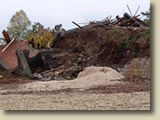 After
all that has happened to the Orthodox Archdiocese of Ochrid in
the past two and a half years, hardly anything has gone unsaid.
In order to evict a Bishop from his place of residence, forcibly
with police, without a court decision; in order to conduct police
searches of the apartments of the Bishop and the members of the
Orthodox Archdiocese of Ochrid whenever it occurs to you; in order
to try and sentence Bishops for entering a church and to detain
them, to try and sentence them for allegedly fanning ethnic hatred
by serving in the catacombs where the government has forced them;
in order to chase monks and nuns from their monasteries, where
they have spent sleepless nights praying for all people to build
a close relationship with God; in order to do all these things,
it is necessary to be completely ouside of many centuries of Christian
civilization. After
all that has happened to the Orthodox Archdiocese of Ochrid in
the past two and a half years, hardly anything has gone unsaid.
In order to evict a Bishop from his place of residence, forcibly
with police, without a court decision; in order to conduct police
searches of the apartments of the Bishop and the members of the
Orthodox Archdiocese of Ochrid whenever it occurs to you; in order
to try and sentence Bishops for entering a church and to detain
them, to try and sentence them for allegedly fanning ethnic hatred
by serving in the catacombs where the government has forced them;
in order to chase monks and nuns from their monasteries, where
they have spent sleepless nights praying for all people to build
a close relationship with God; in order to do all these things,
it is necessary to be completely ouside of many centuries of Christian
civilization.
The
Former Yugoslav Republic of Macedonia, which is far from being
a state of law, is a state where political decisions are made
above the law. But if the state is to be blamed for all this vandalism,
then the schismatic organization calling itself Macedonian Orthodox
Church is to be blamed doubly. Since the Inquisition of the Middle
Ages, which was characteristic of the Roman Catholic Church, to
this day it was not know that anything like it existed elsewhere.
Today in the Former Republic of Yugoslavia we see schismatics
conducting a "sacred trial" or inquisition, and the
state implementing it. The Orthodox Church did not have an inquisition,
and under its ecclesiological and canonical laws, it is not possible
for an inquisition to exist. Thus, we have another way of recognizing
that these schismatics are not the Church. They are a band of
outlaws gathered to realize their personal interests, and they
will continue to exist as long as their interests are protected.
The only sad thing is that neither the media nor the people it
informs cannot realize this. Can an organization that destroys
churches and monasteries be called the Church? We should remember
that this was not done even by the Turks, who were of a different
faith. And what kind of a future can a people that has begun to
destroy churches expect? It is the same as destroying your own
home; even worse, it is like destroying your own body, for the
church is the body and soul of a people.
The
power of the Church is in fact in the Spirit that builds everything
anew. Is this the first time in the history of the Church that
holy shrines were destroyed? They were destroyed by Nero, Diocletian
and Julian the Apostate, by Hitler, Stalin and Tito, and now they
are being destroyed by Branko. Do you think there is a difference
between Hitler and Nero, or between Branko and Stalin? They are
destructive men who destroy and do not build; who spend and do
not earn; who wish to have slaves, so that they can remain slaves
to their passions.
This
monastery is been build in a non-urban zone and there more than
50 permanent buildings in its immediate vicinity, none of which
have a building permit. This is not because people do not want
to legalize their buildings but because, according to the law,
you cannot get a building permit in a non-urban zone. But why
then were all the buildings around the monastery not also destroyed;
why were all the villages and half the cities built in non-urban
zones not all destroyed?
Because
it is easier to fight against unarmed monks and nuns who have
no weapons except their tears. The building inspectors should
go to Tetovo or Gostivar to tear down some palace, which cannot
even be described as a house. What kind of a president is the
president, and what kind of state is it where they beat you and
forbid you to cry?
A
state and a people that have begun to destroy destroy churches
and monasteries are already hosts to the "abomination of
desolation” mentioned in the Holy Scriptures (Dan 9.27). It is
hard to expect much from this state and this people. But regardless
of how far it has fallen because of the icon of God it carries
within the people know how to recognize those who wear the masks
of saints but are wolves in their heart. Petar was recognized
as a wolf in Bitolj long ago. The residents of Bitolj do not respect
him, let alone love him. His maliciousness and hypocracy have
transcended all bounds and now are regarded as identical with
that of the Devil.
It
is well-known that the Jews used the Wailing Wall to make a state.
The Orthodox Archdiocese of Ochrid today stands before a wailing
wall. But it is not a state, and it will use the wall to make
a Kingdom not of this world. The remains of the wall that the
schismatics have not yet destroyed with the help of the state
will be part of the plan for the new Jerusalem being built by
Christ, for the stones of that wall are chiselled following the
example of Herma's tower, mixed with tears of redemption, and
fortified by joyous sorrow and suffering for God's justice.
Schism
is many times more terrible than heresy. Heretics are outside
the Church and can be easily recognized; schismatics destroy from
within. Only those who have not had dealings with a schismatic
do not recognize the kind of people they are.
Orthodox
Archdiocese of Ochrid

DIOCESE
OF BACKA AND MATICA SRPSKA ORGANIZE LECTURE
As
part of the visit of the delegation of the Publishing Council
of the Russian Orthodox Church to the Diocese of Backa, on Wednesday,
October 27, 2004, beginning at 7:00 p.m., a lecture will be held
in the formal auditorium of Matica Srpska in Novi Sad on the themes
“The Challenge of Globalization and the Orthodox Church” (speaker:
Deacon Andrei Kurayev) and “The Relevancy of Orthodox Ascetic
Teachings about Humanity” (speaker: academician Sergei Sergeievitch
Horuzhy).

We
are forwarding an official statement by the Diocese for Raska-Prizren
and Kosovo and Metohija regarding the interview of UNMIK chief
Soren Jessen-Petersen for the most recent issue of the German
weekly "Der Spiegel" where he gravely insulted the Serbian
Orthodox Church and the suffering people of Kosovo and Metohija
NOT
ONLY ARE THEY BURYING US ALIVE BUT
THEY ARE FORCING US TO REMAIN SILENT...
Petersen's
statement in "Der Spiegel" represents an extremely irresponsible
act both politically and morally and gravely insults the families
of killed Serbs and all those who for the past five years have
been living a horror story directed by UNMIK and ethnic Albanian
leaders. At the same time, the UNMIK chief's comments at this
critical period incite further violence toward Serbs and provide
an alibi to the criminals who for more than five years have been
carrying out a policy of ethnic terror under UN rule. Everything
that the Serbs in Kosovo and Metohija have gone through under
UNMIK administration, especially during the March pogrom, really
can be rightfully called horror and not horror produced by the
imagination but the consequence of the catastrophic results of
the UN mission, which after five years of violence and discrimination
wants to proclaim its own overnight triumph on the tragedy of
an entire people and its Church. This least successful of all
peacekeeping missions in the history of the UN has only brought
suffering and pain to the non-Albanian population of Kosovo and
Metohija, allowing the perpetration of systematic violence and
crimes against Serbs, Roma, Gorans and other minority communities
and without one single UNMIK chief being held accountable.
ORTHODOX
DIOCESE OF RASKA-PRIZREN AND KOSOVO-METOHIJA
COMMUNIQUE
ERP
KIM Info Service
Gracanica, October 20, 2004
"So
you also outwardly appear righteous to men, but within
you are full of hypocrisy and iniquity." (Mat. 23:28)
In
an interview for the most current issue of the German weekly "Der
Spiegel" UNMIK chief Soren Jessen-Petersen has continued
the impudent campaign of mud-slinging at the Serbian Orthodox
Church, which he now accused with unprecedented hypocrisy of working
with Belgrade politicians "to spread horror stories that
have nothing to do with the reality in Kosovo and that are counterproductive
for the Kosovo Serbs".
This
latest statement by Petersen, and the cynical words of "Der
Spiegel" reporter Renate Flottau that "many KFOR troops
and UN administrators do not ascribe the lack of freedom of movement
for the Serbs to a threat from the Albanians" (presumably
it is a figment of the Serbs' imagination) and that "Orthodox
Bishop Artemije has become accustomed to playing the role of victim"
represents the continuation of a comprehensive and skillfully
planned media campaign launched from UNMIK headquarters with the
recent personal attack on Bishop Artemije for withdrawing the
representative of the Serbian Orthodox Church from the commission
for the restoration of destroyed churches. In a recent telephone
conversation, a UN official and close associate of Petersen openly
threatened that the Church would have serious problems because
of its position. Through UNMIK's communiques and certain foreign
media this slanderous campaign is continuing from day to day primarily
against those who wish to express their dissatisfaction with the
work of the UN mission and Kosovo institutions through their legitimate
right of nonparticipation in the upcoming Kosovo elections, which
are a parody of democracy and have the goal of drowning out every
voice of protest and dissent with the policies currently promulgated
by the new UNMIK chief and those who stand behind him.
Petersen's
statement in "Der Spiegel" represents an extremely irresponsible
act both politically and morally and gravely insults the families
of killed Serbs and all those who for the past five years have
been living a horror story directed by UNMIK and ethnic Albanian
leaders. At the same time, the UNMIK chief's comments at this
critical period incite further violence toward Serbs and provide
an alibi to the criminals who for more than five years have been
carrying out a policy of ethnic terror under UN rule. Everything
that the Serbs in Kosovo and Metohija have gone through under
UNMIK administration, especially during the March pogrom, really
can be rightfully called horror and not horror produced by the
imagination but the consequence of the catastrophic results of
the UN mission, which after five years of violence and discrimination
wants to proclaim its own overnight triumph on the tragedy of
an entire people and its Church. This least successful of all
peacekeeping missions in the history of the UN has only brought
suffering and pain to the non-Albanian population of Kosovo and
Metohija, allowing the perpetration of systematic violence and
crimes against Serbs, Roma, Gorans and other minority communities
and without one single UNMIK chief being held accountable. Since
UNMIK does not want to confront the Albanian extremists, there
are active efforts being made to suggest that the Serbs and especially
Bishop Artemije are guilty for their own misfortune and for unsuccessful
returns and the restoration of destroyed houses and churches,
thus rationalizing the continuation of ethnic cleansing.
However,
despite all slander after the last decade or so Bishop Artemije
will be remembered as an authentic voice of the Serbian people's
conscience and a "good shepherd" (Jhn 10:11) who carried
the truth about events in Kosovo and Metohija from Washington
to Moscow, and from Berlin to Paris and London. His position was
and is unchanged: that violence is not and cannot be the path
to the progress of either a society or an individual. After becoming
one of the major proponents of resistance against dictatorship
during the time of the Milosevic regime, following the establishment
of so-called peace in Kosovo and Metohija Bishop Artemije remained
the voice "of one crying in the wilderness" (Mar 1:3),
pointing out that one evil rule had been replaced by another that
is even worse because it enjoys international support and supposedly
acts in the name of democracy and multiethnicity. As dozens of
Christian churches and monasteries were reduced to ashes under
the guise of false peace, and hundreds of Serbs, Roma and other
members of minorities were killed and kidnapped throughout Kosovo
and Metohija, Bishop Artemije persistently called on the international
community to fulfill its responsibilities, and to protect those
who are exposed to injustice. At the same time, he called for
Serbian repentance, for a change in the regime and a renouncement
of Milosevic's policy in order to start on a new path toward Europe
and the world. He was the first to offer the hand of reconciliation
to the Albanian leaders, the first among Serbs in Kosovo to acknowledge
and condemn crimes against Albanians during the war, the first
to initiate cooperation with UNMIK and KFOR, and lead the Serbs
into the new Kosovo institutions in the hope that democracy can
and must be built only through cooperation and dialogue. Serbian
extremists and false patriots called him a traitor and a foreign
agent, and Albanian extremists called him a Serbian nationalist.
However, before God and throughout the world the moral reputation
of Bishop Artemije has remained unblemished because he was and
is a man fighting for justice, the survival of his Church and
its faithful people in a region where Serbs have lived and prayed
to God for centuries.
And
how has the international community and Kosovo Albanians paid
Bishop Artemije back for his deeply moral position and personal
sacrifice? With new crimes, new destroyed churches and dug up
cemeteries. Is this a defeat for Bishop Artemije and his Gospel-inspired
"politics"? Certainly not, because regardless of all
the tragedies that have befallen the Church and its people, Bishop
Artemije is the moral victor who from start to finish remained
consistent in his actions and with evangelical principles. Today,
as the smoke still rises from the ashes of Serbian property destroyed
in the March violence, and the organizers of that violence shamelessly
strut before the television cameras, the supposed peacemakers
in Kosovo have risen against the Bishop only because he dared
to once again speak the truth to their face, something that is
disagreeable to them at this time: that no one has the moral right
to push those who are deprived of every possible freedom and right
to vote in elections that are most necessary to UNMIK and the
Albanian leaders; that those who destroyed churches or peacefully
watched their desecration only yesterday from their UNMIK offices
have the least moral right to define the conditions under which
they are now to be restored, and no right to accuse the Church
for the fact that no one has done a thing on restoration. The
Bishop remains consistent in the belief that democracy in Kosovo
and Metohija must be built on the joint reconciliation of Serbs
and Albanians, on common forgiveness and repentance; however,
he also remains consistent with the teaching of the Gospel that
one must not build his "house upon the sand", i.e. upon
lies and deception, but upon the "rock" of truth and
justice (ref. Mat. 7:25-27).
We
should not deceive ourselves: Whether the Kosovo Serbs vote in
the elections or not, it will not bring any improvement either
to the Serbs or to Kosovo for as long as UNMIK and the international
community continue their policy of tolerating Albanian ethnic
violence and rewarding Kosovo institutions with even greater competencies
to the detriment of the non-Albanian population and the stability
of the entire region. The Church first and foremost addressed
a pastoral message to the public, witnessing the truth that injustice
cannot be called justice nor can lies be called the truth; that
individual and collective freedom is the basic prerequisite for
normal participation in the building of a democratic society;
and that the misfortune of the Kosovo Serbs should not be merely
used for mutual political battles and the winning of international
favor. At the same time, the Church has warned UNMIK that it does
not have the moral right to manipulate and threaten the Serbs,
using them as a justification for its own failures. This was and
will remain the position of the Serbian Orthodox Church despite
all threats, blackmail and insults, no matter from which side
they come.
[All
citations are translated from Serbian.]

SERBIAN
ORTHODOX CHURCH MUSEUM
RECEIVES VALUABLE ICON OF ST. NICHOLAS OF MYRA
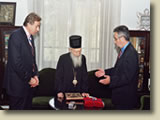 On
Monday, October 25, 2004, the Serbian Orthodox Church Museum in
Belgrade received an exceptionally valuable gift. An icon of St.
Nicholas of Myra the Wonder-worker was presented to His Holiness
Serbian Patriarch Pavle by Mr. Dusan Rozic, in the presence of
Museum director Slobodan Mileusnic. Mr. Rozic is a private art
collector who has lived in Zurich for more than thirty years. On
Monday, October 25, 2004, the Serbian Orthodox Church Museum in
Belgrade received an exceptionally valuable gift. An icon of St.
Nicholas of Myra the Wonder-worker was presented to His Holiness
Serbian Patriarch Pavle by Mr. Dusan Rozic, in the presence of
Museum director Slobodan Mileusnic. Mr. Rozic is a private art
collector who has lived in Zurich for more than thirty years.
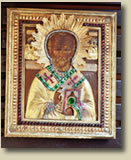 Russian
Tsar Nicholas II Romanoff originally presented this icon to King
Aleksandar Obrenovic of Serbia. The icon was created in the 18th
century by court artisans. It is decorated with an 18-carat gold
plate, emeralds, diamonds and rubies. Russian
Tsar Nicholas II Romanoff originally presented this icon to King
Aleksandar Obrenovic of Serbia. The icon was created in the 18th
century by court artisans. It is decorated with an 18-carat gold
plate, emeralds, diamonds and rubies.
His
Holiness Patriarch Pavle sincerely thanked Mr. Rozic for his gift
and his elevated sense that it is necessary for this precious
icon to remain in the Serbian Church and its people.

BELGRADE
BOOK FAIR 2004
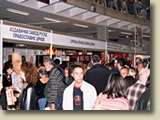
PROMOTIONS
AT SERBIAN ORTHODOX CHURCH STAND
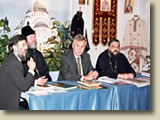 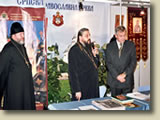
Presentation
of editions of the Publishing Council of the Moscow Patriarchate
and the album “75 years of the Russian Patriarch”. Speakers include
Protopresbyter Vladimir Silovyev, and Father Vitaly Tarasyev,
administrator of the Office of the Moscow Patriarchate.
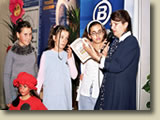
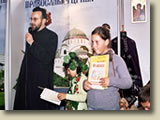 
Presentation
of the Orthodox children’s magazine “Svetosavsko zvonce”, the
children’s book “The Magic Meadow” and the Workbooks for Religious
Instruction by Presbyter Kosta Kovjanic. Participants include
Dr. Drago Sando, authors Slavica Tomic and Father Kosta Kovjanic,
and Radmila Misev, editor in chief of “Svetosavsko zvonce”.
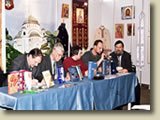
Russian
Church presents its book “The Liturgical Use of Bells”
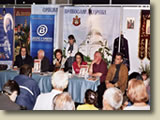
Presentation
of special issue of the magazine “Svevidje”
on THE SERBIAN LANGUAGE IN MONTENEGRO
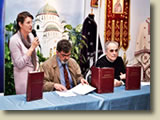 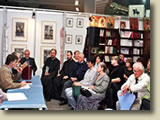
“The
Bible Encyclopedia, Vol. 1, A-L” by Protodeacon Radomir Rakic.
Speakers include the author and Zivica Tucic

[Serbian
Translation Services]
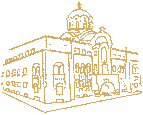
Copyright © 1999-2004 by
The Information Service of
the Serbian Orthodox Church
11000 Belgrade
Kralja Petra I no.5
+381 11 3282 596
e-mail
|

